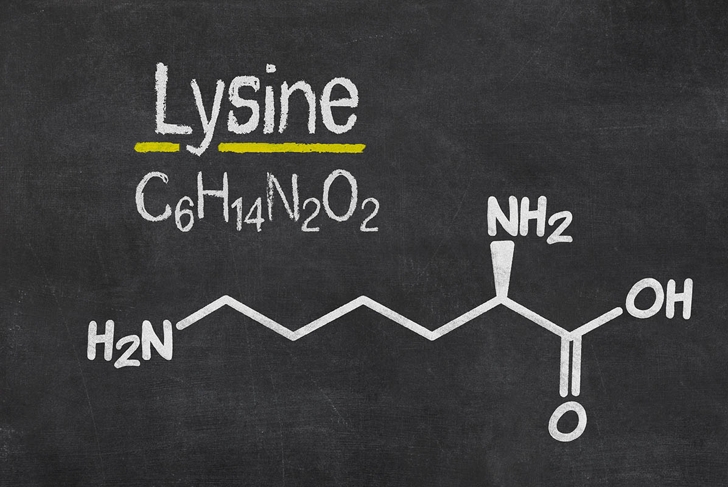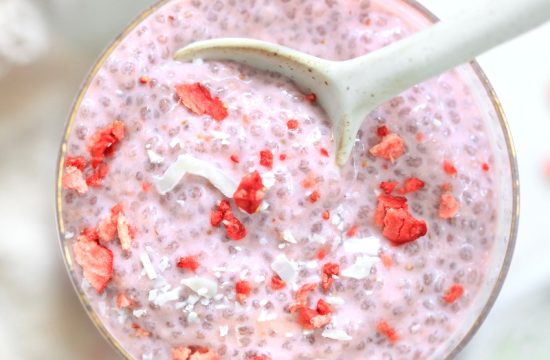
Lysine is another great reason to keep filling your plate with lentils, kale, quinoa, and other nourishing protein-rich foods. It impacts your overall health through its roles in forming collagen, hormones, immune cells, and more. Lysine is one of the nine essential amino acids that your body needs to make protein—and you can only get it through your diet or supplements.
01
Prevents cold sores

If cold-sore flare-ups are dragging you down, it may be a sign that you’re not getting enough lysine. Lysine is a natural therapy for preventing recurring cold sores caused by the herpes simplex virus (HSV). It has also been shown to reduce the severity and healing time of these pesky lesions. Lysine works by balancing the effect of the amino acid arginine that HSV needs to replicate, while also repairing and healing cold sore-blistered skin.
02
Helps form collagen

Lysine is one of the secrets to maximizing your body’s production of collagen, a protein that makes up and helps repair tissues in the skin, bones, cartilage, and joints. Considered by some to be the most important essential amino acid, lysine is critical to building the crosslinked network of collagen that stabilizes and gives structure to healthy body tissues.
03
Builds strong bones

Lysine is one of the lesser-known nutrients that you need to build strong bones. You use lysine to absorb calcium into the bloodstream efficiently, for your kidneys to keep up the positive calcium balance that promotes bone mineralization, and for linking the collagen fragments that form bone scaffolds. One study found that a higher lysine intake, along with four other amino acids, lowered the incidence of osteoporosis or osteopenia in women by up to 19 percent.
04
Balances blood sugar

Snacking on protein-rich foods, such as hummus or Greek yogurt, is a fantastic way to keep blood sugar steady—thanks in part to lysine! In one study, lysine was found to lower blood sugar spikes in volunteers by 9 percent within 60 minutes of drinking a nutrition drink. Lysine may also lower the risk of diabetes complications by inhibiting dangerous reactions between high blood sugars and proteins throughout the body.
05
Calms anxiety

Anxiety affects at least 19 percent of Americans. In many cases, a poor intake of nutrients, including lysine, plays an underlying role. Evidence shows that lysine influences the body’s chemical messengers (neurotransmitters) involved in stress and anxiety. A few studies have shown that men and women who did not getting enough lysine through their diet could lower their levels of chronic anxiety by supplementing or eating lysine-fortified foods.
06
Promotes heart health

Keeping your lysine intake up may prevent the dangerous build-up of plaque in your arteries. Lysine has been shown to block bad cholesterol molecules from sticking to artery walls. This activity is effective enough that lysine-deficient men and women who took 1 g of lysine per day were found to lower their systolic blood pressure levels by 4 to 5 percent. The body also relies on lysine to make L-carnitine, a nutrient that helps fuel energy production in cardiac muscle.
07
Activates immunity

If you’re aiming to make it through the cold and flu season unscathed, don’t overlook lysine. As an essential amino acid, lysine is a key nutrient in the immune support puzzle. The body needs amino acids to make and activate immune system cells, such as T-cells and cytokines. Researchers have also found evidence that lysine can inhibit the SARS-CoV-2 virus (the strain of coronavirus that leads to COVID-19) from causing infection.
08
Builds muscle

When it comes to fueling your muscles for exercise, amino acids like lysine play a central role. In one study, young men who supplemented with a high-lysine diet for eight weeks increased their muscle mass enough to enjoy a 7.5 percent boost in strength. Older women have been shown to improve their exercise performance and muscle function after supplementing with lysine—hinting at its potential for fighting muscle loss as you age.
09
Fights genital herpes

Just like cold sores, genital herpes is caused by a variant of the herpes simplex virus (HSV), which relies on the amino acid arginine to reproduce. Thanks to lysine’s competitive relationship with arginine in the body, increasing your intake has an anti-viral effect against HSV. Supplementing daily with lysine, while also avoiding arginine-rich foods like turkey meat and pumpkin seeds, is a popular natural option for preventing genital herpes lesions from forming.
10
Keeps carnitine levels up

As a key nutrient needed for the body to make carnitine, lysine has an indirect role in keeping the body’s energy production up. This is because carnitine, an amino acid derivative concentrated mostly in the muscles and heart cells, is responsible for feeding the cells with fatty acids that are burned to make energy. On average, adults rely on lysine to meet about 25 percent of their carnitine needs.











